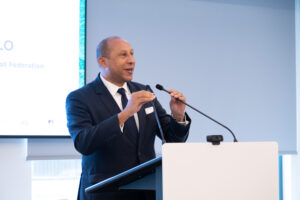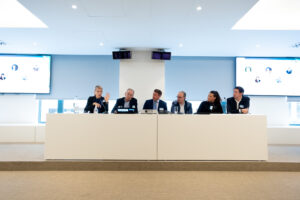On November 15, the European social charter for sportevents and its 13 commitments were revealed during a conference in the French Permanent Representation to the European Union, in Brussels. Co-organized by EASE and Sport and Citizenship as part of the ESCSE project, this event was an opportunity to discuss the social impact of sport events with European players, including project partners.
THE EUROPEAN SOCIAL CHARTER OF SPORT EVENT IS NOW AVAILABLE ! FEEL FREE TO DOWNLOAD IT AND POST IT ON YOUR SOCIAL NETWORKS

The social impact of sport events
Launched in 2021 by EASE, the European Project ESCSE (European Social Charter for Sport Events) has been supported by the Erasmus+ program of the European Union, in order to recognize the social dimension of sport events. If the economic impact of sports programs or major events is often measured, it is essential today to focus on the effect of sport on society and to perceive its impact on social transformations, particularly in the dawn of the Paris 2024 Olympic and Paralympic Games. In addition, UNESCO specifies that “ major sporting events can generate significant positive and negative impacts at the economic, social and environmental level. However, these events can also have harmful repercussions on a societal and environmental scale.
Faced with these social challenges and these major concerns, this project aims to create a European social charter adapted to the social responsibility issues targeted by the majority of sports event organizers.
To design this document, several partners worked with EASE on this project: the Paris 2024 Organizing Committee , the Rugby World Cup France 2023, the Slovenian Olympic Committee , the European Federation of Company Sports, the Italian Volleyball Federation, the ASSER Research Institute , the Institute for Sports Governance, the French Quadball Federation as well as the Sport and Citizenship think tank.
A reference document
The main mission of EASE is to improve social dialogue at the European level, by creating a common framework between all the employers’ organizations in Europe. Among these organizations, the sport event organizers are crucial because they employ a large number of employees and volunteers.
The European Social Charter for Sport Events will provide a reference document in the social framework for the organization of all major future sport events in Europe. Ultimately, this document will facilitate the design of indicators to measure the commitments made. The aim is to contribute both to European sports policy by promoting the governance of European sport events, and to European social policy .
The charter was the subject of a study of existing needs in terms of social commitments. A “ test ” social charter was written and then tested by several partners to be able to adapt it based on the feedback received. It was finally made public during the final conference on November 15, 2023 in Brussels.

Presentation of the European Social Charter for Sport Events
Major figures in the project, including Paris 2024, organizer of the 2024 Olympic and Paralympic Games, came together for this exceptional event co-organized by EASE and Sport and Citizenship in Brussels. This conference was rich in discussions.
To begin, Philippe Diallo and Hugo Petit-Jean (EASE) unveiled the social charter as well as its 13 commitments “ to make sporting events more responsible in terms of governance, human resources involved and the environment ”. The document is therefore based on 3 main themes including governance, people and sustainable development.
Following this presentation, Laurent Thieule, Honorary President of Sport and Citizenship, discussed with partners the testing of the charter as well as the social impact of major sporting events in the presence of:
- Marie Barsacq ( Paris 2024 ). For the Impact and Legacy Director of Paris 2024, this social charter complements the Paris 2024 charter. She discussed the social responsibility of the Olympic and Paralympic Games.
- Arnaud Breton ( Rugby World Cup France 2023 ). On his side, the Director of Impact, Legacy and Family of Rugby within France 2023 looked back on the Rugby World Cup, emphasizing that there is a “great responsibility to carry out and promote a sporting event in a sustainable way ” .
- Marco Miotti ( Italian Volleyball Federation ). He highlighted that a communication effort was needed on the social impact. He tested the charter on their European Volleyball Championship.
- Taja Skorc ( Slovenian Olympic Committee ). The Director of Sport for All and the local sports service tested the charter on a marathon, a Slovenian event.
- Frédéric Delannoy ( European Business Sports Federation ). The general administrator of the European Federation of Company Sports spoke about the social place of sport in European corporate sports games.

Other topics were discussed including the establishment of an inclusive council, recognition of the skills acquired by volunteers during sporting events, environmental impacts as well as the sporting heritage of the events .
At the end of the event, the charter was made accessible to all. Find out now by clicking here.